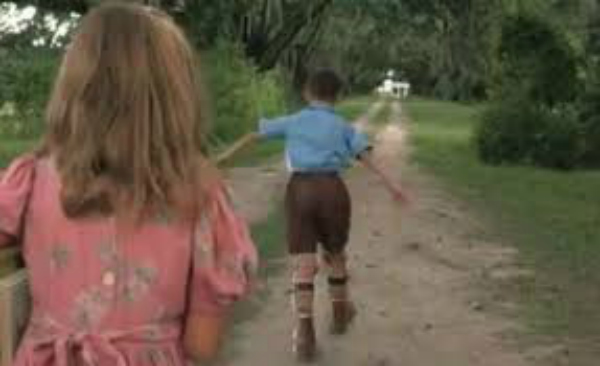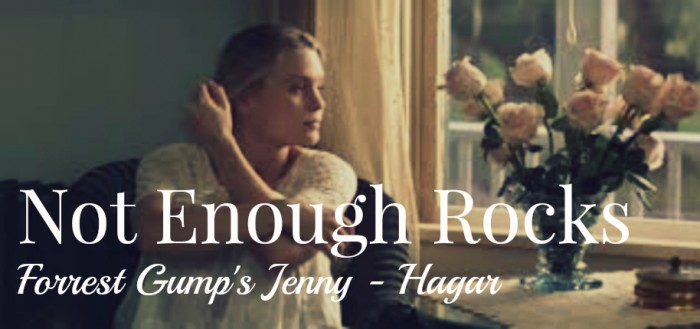The 1994 movie Forrest Gump won six Oscars and is the 13th top-rated movie on IMDb’s website. In it Jenny, a beautiful little blond girl befriends the mentally slow young boy Forrest Gump (played by Tom Hanks) in elementary school. She tries to protect him and is the one who shouts, “Run, Forrest! Run!” when bullies pick on him.
Jenny, played beautifully by Robin Wright, becomes the love of Forrest’s life. No matter where he goes or what he does—and he does a lot and is present at many historic moments—he is always thinking of her. Even though he is devoted to her, he understands that Jenny has many issues. As a child she was abused by her father. At one point you see young Jenny running through the fields and trying to hide from her father. She prays, “Dear God, make me a bird. So I could fly far. Far far away from here.”
Forrest narrates: “Mama always said, God is mysterious. He didn’t turn Jenny into a bird that day. But instead—he had the po-lice say Jenny didn’t have to stay in that house no more. She went to live with her grandma, just over on Creekmore Avenue. And that made me happy, because she was close. And some nights she’d sneak out and come on over to my house, because she said she was scared. It may have been because of her grandma’s dog, or somethin’.”
As a young adult Jenny was still trying to escape her pain in the hallucinogenic drugs and promiscuous living of the 60s hippie communes. For a while, their paths go different directions, but every time Forrest sees Jenny, he tries to help her have a better life.
At one point in the movie Forrest and Jenny walk by the abandoned, dilapidated shack she grew up in. Remembering the sexual and other abuse she suffered there from her father, Jenny begins crying and throwing rocks at it. The voice of Forrest as the narrator is heard saying sadly, “Sometimes I guess there just aren’t enough rocks.”
Despite his help, Jenny keeps going back to the old life. When she is nearly dead from drugs, she comes back home and Forrest takes her in and nurses her back to health. Only then does she understand how much he loves her. Jenny becomes pregnant from the one night she sleeps with Forrest. She runs away again after that night and doesn’t let him know where she is. She only contacts him when their child conceived that night is about five. She is dying (the movie hints that she has one of the earliest cases of AIDS) and has no one to take care of her son. Forrest brings her and Little Forrest home to live with him and marries Jenny. He takes care of her until she dies. And he begins raising their son with tender care.
Forrest’s mama always told him: “Life is like a box of chocolates. You never know what you’re gonna get.” Most of us have found that to be true. And sometimes we don’t get chocolates, we get rocks.
Sometimes There Just Aren’t Enough Rocks: Hagar
When we come to the biblical story of Hagar we find that saying was true for her over 4000 years ago. Hagar, an Egyptian maidservant, would never have expected to bear the child of her wealthy master, the patriarch Abraham. Neither would she have guessed that his wife Sarah, the woman whose idea it was, would have turned on her when she became pregnant. Like Forrest Gump’s Jenny, Hagar had times of running away and times of coming back. In all of it, she did all she could to protect her child.
Look at Genesis 16. In the custom of that day it was legal for a barren woman to give her maidservant to her husband as a wife. Any child born of that union would be considered the first wife’s child. All the husband had to do was say, “You are my son” and the son would become the legal heir as well as the natural-born heir. So what the Bible characters we know as Abraham and Sarah did was acceptable in the culture of their day. However, hindsight-insight tells us that what is legal is not always godly, nor is it necessarily a good idea.
Sarah’s plan backfired after the hoped-for pregnancy became reality. Hagar, used by Sarah for her own ends, began to despise her mistress. We don’t know exactly what caused the blowup. Hagar’s pregnant state may have given her a sense of entitlement which she flaunted. Maybe she didn’t think she would have to work anymore. With hormones raging, she could have made cutting comments about or to Sarah.
And Sarah, undoubtedly jealous that this slave girl conceived almost immediately whereas she had never been able to, began to abuse the girl. In that time, and for much of history, the owner of a slave or indentured servant could legally beat them, sometimes even kill them. I doubt this comes as a shock to you, but believers aren’t always kind and gentle people. We know this because the Bible neither condones nor whitewashes their behavior.
The Lord who sees me: Genesis 16:7-16
The “angel of the Lord” comes to Hagar in the desert by a spring or well. But this is no ordinary angel. We know it is the pre-incarnate Christ because of what He says in verses 10 to 11 [emphasis mine]: Then the angel of the Lord told her, “Go back to your mistress and submit to her. The angel added, “I will increase your descendants so much that they will be too numerous to count.” The angel of the Lord also said to her: “You are now pregnant and you will give birth to a son. You shall name him Ishmael, for the Lord has heard of your misery.”
Doesn’t this beautifully show the grace of God? Christ made one of his pre-incarnate appearances to an Egyptian slave girl who was probably not a believer and who had become pregnant by Abraham (a believer) through no fault of her own. About the time we think He’ll show Hagar the best path to run away and give her some provisions, He tells her to go back and submit to Sarah and to name the child Ishmael, which means “God shall hear.”
And Hagar said, “You are the God who sees me. I have now seen the One who sees me.” He is the God who saw Hagar and the God who sees each of us.
God, who loved Hagar, told her to go back and submit (v. 16). Do you think the circumstances were as difficult when she went back? Maybe Abraham, not wanting to lose the baby he fathered, would have told Sarah not to be so hard on her. He’d been too passive about that before. And maybe Hagar, who had an encounter with God in the desert, also had a different attitude.
Hagar was mistreated, reacted with fear, and ran away. But when she met God in the wilderness, she had a spiritual awakening. She first heard that God had heard her son’s cries and hers and was ready to help her. She then saw that Abram and Sarah’s God was the One who saw her. She was able to say, “I have now seen the One who sees me.” She obeyed God and went back and submitted to the life that was hers for that time.
When life got difficult, Hagar at first used the Jenny plan: she ran away. God sent her back because that is where He wanted her—facing her problems, not running from them. Does God always plan for us to be happy? It doesn’t seem so. As someone said, God didn’t call you to make you happy; He called you to make you holy.
©2016 by Vicki Huffman
*Affiliate links included.
About Vicki Huffman
National award-winning journalist Vicki Huffman's latest book is Soon to Come: The Revelation of Jesus Christ. It is a verse by verse exposition of the only purely prophetical book in the New Testament. Her other five books are: The Jesus Moses Knew: How to See Christ in the Old Testament; A Secret Hope (novel); Still Looking: Finding the Peace of God in Job Loss; Plus Living: Looking for Joy in All the Right Places, and The Best of Times. All are available in print and e-book on amazon.com. Vicki is a national award-winning author who has taught the Bible for many years. She was an editor for several Christian publishing houses, including Thomas Nelson and David C. Cook Ministries.
- Web |
- More Posts(120)










